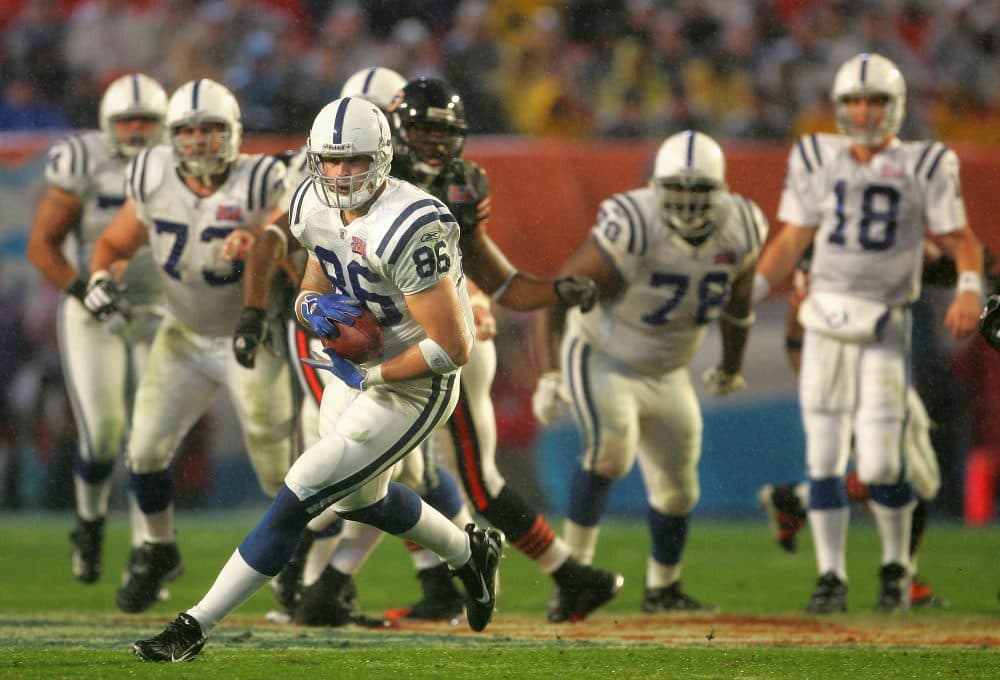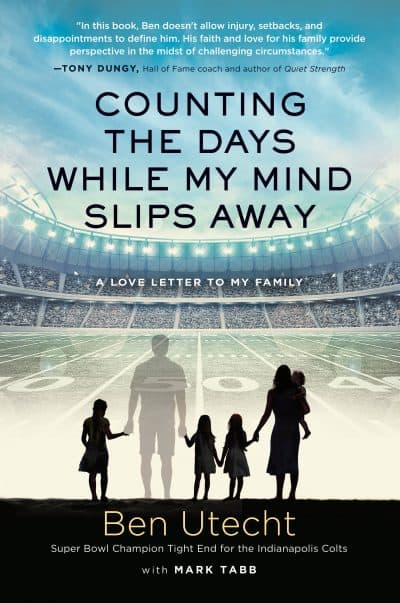Advertisement
'Why Can't I Remember That?' — Former NFL TE Ben Utecht, Age 35
Resume
"It just seems that there's always been, I guess, providence at work," former NFL tight end Ben Utecht says. "As a pastor's son, I like to believe that."
Ben Utecht's story is a story of faith. But since he was a football player, it’s also a story about football. The football part of it begins when he was just a kid, throwing the ball in the backyard with his father.
"In a little Minnesota, Scandinavian town called Lindstrom," he says.
Utecht says those days in the backyard in Minnesota shaped his life — and inspired his love of football. But he doesn't really remember them.
"It's a difficult thing to explain, you know, to sit across from family and friends and hear stories and memories, and, at times, everybody at the table remembers an event, and I kinda sit there in my own quietness, kinda scratching my head thinking, 'Why, you know, why can't I remember that?'" he says.
Utecht does remember the injuries he sustained playing football. First there was the hip fracture that came during the second game of his senior season in high school. Then he broke his left ankle during an all-star game the summer before college. While playing for the University of Minnesota, Utecht suffered his first documented concussion. Then there was the stress fracture in his foot — Utecht kept playing through that injury. And then, as his senior year in college was ending, Utecht suffered the injury that took him from being a potential first round draft pick to wondering if he'd be drafted at all.
"My senior year, I had unfortunately torn my abs from the bone on both sides. It was a devastating time. I thought football was over. And a Hall of Fame coach by the name of Tony Dungy made a promise to me in front of about 700 University of Minnesota alumni. He said, 'Ben, if for some reason you slip through the cracks, I promise you I'll be the first person to call.' And everybody clapped and I had a big smile on my face, but it went in one ear and out the other, thinking there's 32 NFL teams.
"But I went undrafted, and it was embarrassing, it was difficult. So I'm sitting across the table from my agent. The free market opens for the leftover players, the free agents. Fifteen seconds after, the phone rings and who do you think it was? Tony Dungy. It was Tony Dungy. Tony said, 'Ben, we didn't think it was going to happen. We know how talented you are when you're healthy. We want you to be a Colt. We have a doctor that's the best in the country at fixing your injury. And we want to get you surgery, give you the whole first year to recover, and we'll pay you as though you're a playing rookie.' And three years later, I'm a starting tight end on a Super Bowl championship team."
The injuries would keep coming, but it wasn't the abs or hip or foot that caused the most serious, long-standing problems.
"My very first head injury was when I was 4 or 5 years old, running around the house listening to the Superman soundtrack and I flew headfirst into the dresser and had to get rushed to the emergency room," Utecht says. "But, you know, looking back on football, over the course of my college career and NFL, there was a total of five diagnosed concussions."
"I had a family meeting with my mom and dad and my wife and explained the situation, and my dad said something that I hope I don't ever forget, which was, 'Ben, if you choose to play football again, I will never watch you.'"
The first three of those concussions didn't worry Utecht. Neither did the countless subconcussive hits he suffered in practices as well as games. As he had with his other injuries, he put his trust in his faith that he would be healed. Though Dr. Bennett Omalu had discovered CTE — chronic traumatic encephalopathy — in the brain of NFL hall of famer Mike Webster back in 2002 — two years before Utecht's NFL career began — Utecht wouldn’t even hear Omalu's name until after he retired from football. But when he suffered his fourth diagnosed concussion, on Sept. 30, 2007, in a game against the Denver Broncos, there was something about that injury that made Utecht start to worry.
"I had ended up on the ground and a pursuing defender jumped over me and his cleat clipped the back of my helmet," he says. "I can only tell you this because of what I watched on film, but my head bobbed down, my body went limp. And about 10, 15, 20 seconds after, I regained consciousness and I stand up and high-five teammates and run off to the sideline. And I have absolutely no memory of that. And so for the first time, I'm sitting in the film room watching this. It's almost like it never happened."
Life After The NFL
That feeling — of losing the memory of an event or a moment or a conversation — would become more and more familiar to Utecht.
And it only got worse when, less than two years later, he suffered another injury to his brain. This time, he kept a journal of his symptoms.
"8/14/09: Woke up with slight headache," Utecht wrote. "Tried doing more activities around the house but experienced increased dizziness. Still feeling as if I'm in a daze. Also, still feeling impatient and having trouble concentrating. I continue to struggle with what I was going to say, like, my mind just goes blank."
Two years later, Utecht and his wife, Karyn, had moved back to Minnesota. He was still feeling the cumulative effects of those concussions and subconcussive hits. And a more troubling symptom had developed. One night Ben and Karyn reconnected with some old friends they knew from college.
The two couples sat in the kitchen, trading stories, and eventually the other couple began recalling their wedding day.
"I couldn't place myself there and I just interrupted the conversation and said, you know, 'Matt why wasn't I able to be at your wedding?' And everybody kind of laughed it off as sarcasm," Utecht says. "And I just said, 'No, seriously, why was I unable to be in your wedding? You know I wasn't in training camp or spring camp.' And his wife went up and got their photo album and brought it back and, sure enough, page after page, there I was as a groomsman and a singer in his wedding. It doesn't matter how many times I look at it, it just is gone."
Utecht says he was terrified, driving home that night with his wife, realizing that he had forgotten what would seem to have been such a momentous occasion.
"I don't know how to explain it to you other than — I don't know if it's just the nature of an athlete but there was still this voice inside of me that was saying, like, 'This is no big deal, you're going to overcome it, you're going to beat it, like I had every other injury,'" Utecht says. "And so, I didn't really know how to internalize it properly, I think."
Despite all the memories that were slipping away, Utecht was still thinking about trying to get back out on the field.
"I know that sounds so silly," Utecht says. "But I remember being a couple seasons out and body still feeling really good and, honestly, mind recovering to a place where I felt OK and just wanted to be back on that field. And I called my agent and said, 'Is there any chance I could get a workout with a team?'"
The agent's first response was, "Are you sure about this?" Utecht said he was.
That was in June of 2013. New England Patriots tight end Aaron Hernandez had just been arrested for murder. Utecht figured — hey, that was my position.
The Patriots weren't interested. But the Seattle Seahawks were. Utecht was prepared to fly to Seattle for a workout. But there were a few people he wanted to check with first.
"I had a family meeting with my mom and dad and my wife and explained the situation, and my dad said something that I hope I don't ever forget, which was, 'Ben, if you choose to play football again, I will never watch you,'" Utecht says. "You know, to hear that from the man who first threw me a football, it really put me back in my place and made me realize, you know, what was most important."
Writing A Love Letter

Utecht tried for a career in music for a while. That didn't work out, in part because he couldn’t remember lyrics. But despite everything, he still sees providence in all he's endured.
"The concussions have really made me realize how critical my memories are, and that has made me value, you know, the moments in my life so much more, which has given me more purpose," Utecht says. "So I guess, like all the other injuries in my testimony have led to me becoming a better man, so has concussions."
Now, Ben Utecht has written a book. It's called "Counting the Days While My Mind Slips Away." He's framed it as a love letter to his wife and daughters — a place where they could go to learn about him, if ever he's unable to answer their questions himself ... or remember the people asking them.
"The book came out of a letter that I wrote to my wife, Karyn, and our daughters. And in that letter was the line ,'You will always be my girls,'" Utecht says. "And that turned into a song that was co-written by Rick Barron and Tommy Barbarella. I had no idea what I was going to do with that song until the NFL Players Association asked me to testify at a Congressional Senate hearing on the long-term effects on concussion, and I told a vulnerable story."
"Wouldn't you know the music video went viral? I think it's been viewed over a million times and I think it's really touched families that are in some way connected to brain disorder or brain disease."
It will be seven years on Monday since Utecht's last concussion. Seven years since he last played in an NFL game. But still, some mornings when his body is feeling good and his mind is feeling sharp, Ben Utecht dreams about lacing up his cleats and stepping back out onto a football field.
"Absolutely. Absolutely. I get a smile on my face just thinking about it because there's nothing like being a part of a team and playing in front of a hometown crowd in front of 70,000 people and winning," he says. "Every time we would win in Indianapolis and be walking off the field, they would roar the U2 hit, it's a 'Beautiful Day.' I can still hear it in my head. That's a special memory that always makes me want to go back."
Ironically, perhaps a little cruelly, that memory, unlike many others, remains.
This segment aired on September 3, 2016.
